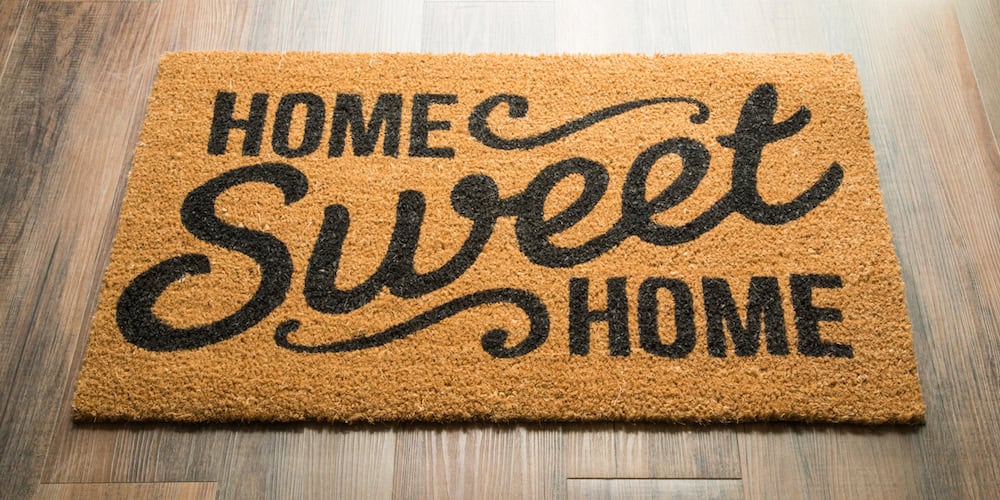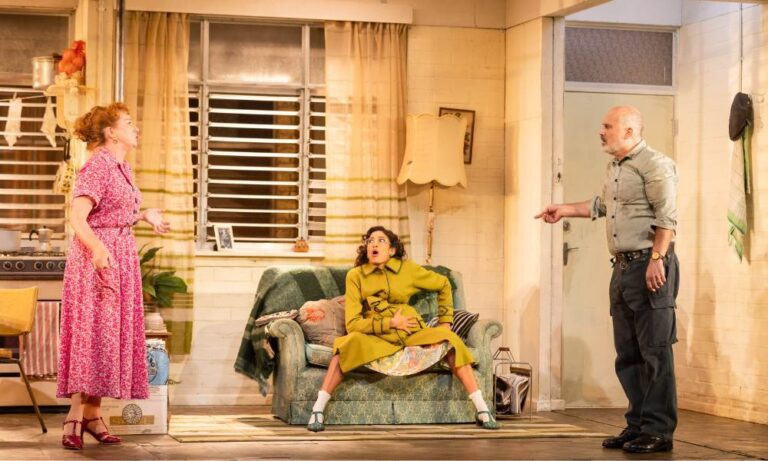Do you have a whole lot of stuff that you hold onto because you might need it one day?”
“Yeah, I guess.”
“Well?”
Apparently there’s little difference between my spare room and her shopping bags and supermarket trolleys.
“It’s just geography,” she tells me. “My stuff is just mobile, yours stays still.”
The child tries to get me to leave him on the side of the road. “It’s just through there,” he points to a thick patch of lantana. There is an opening but no road, no driveway.
“Oh, I’ll come in with you,” I insist. The little boy was left at school, in the sick bay with a cough that sounded thick and green. Children sometimes got left at school, there was nothing unusual about it. Busy working parents got the call but then got busy with other things. Another phone call and they were usually there in minutes, wracked with guilt and full of excuses. This family had no phone contact though, and the other two children had already returned home on the bus after the swimming carnival.
Once through the thick hedge of overgrown weeds, the space opened out to a patch of soft grass rimmed with trees. In the centre stood an old caravan hung with bunting made from the pages of magazines. The other two children played happily on the grass and a pretty young woman, frightened at first, ran towards the sick child and bundled him up in her arms.
We sat then and she made tea on a gas stove on the ground. She rocked the boy in her lap, mopping his face with a washer she rung from a tub by the caravan door. He coughed as she rocked but finally fell asleep and she carried him into the caravan and laid him down on a bed covered in brightly patterned blankets. I stood in the doorway watching, moved by the scene, till she turned and gently pushed me out the door and down the few stairs.
She started talking about her time here in this paddock at the end of an acreage barely traversed in full by its owner. She’d spent the last nine months riding up and down the freeway on a trike with a trailer that she’d found on the side of the road – someone’s trash, her treasure. Her rides yielded a bounty of wallets robbed of their valuables, straw hats and all manner of containers which were now lined up under the annex of the discarded caravan which she called home. In large water containers, oil tubs and tyres grew tomatoes, cucumbers, herbs and onions.
Her three children went to the local school.
“Doesn’t anyone ever ask any questions at school?”
“About what?”
“How you’re living here, with the children.”
“Nobody’s business.”
“But why?” I ask. I wanted to know if it was a conscious choice she had made, to live here under the trees, by the creek, in the old broken caravan. Of course, that would be a highly irresponsible thing for a mother of three children aged five, six and seven to do.
Although isolated to an extent, a person need only watch her leaving on her trike each morning and returning with her haul of roadside flotsam, to become intrigued and start to nose around. The rustic campsite was really only a short walk from the bus stop. Did no one know about the family in the old 1963 Viscount van living off scraps from the side of the road and whatever else their mother could scrounge together?
Limited funds from a Centrelink benefit went where it was needed most. A weekly trip to the laundromat, school shoes, bottled water, medicine, books and pencils, candles and butane to light the little stove where she prepared scant meals, mostly legumes, while softly singing songs from her native Russia.
“Why don’t you get help, get a house? The government will help you.”
Her face flushes with pride and anger.
“Because … it’s difficult,” she shudders, while making herself busy, sorting through the day’s takings on the table laid with a hand-sewn patchwork cloth.
“It’s difficult because I don’t want to be found, I don’t want to lose my kids. I’m just doing my best, like everybody. So long as we stick together, it’s all right.”
“Why? Why would you lose your kids if you ask for help?”
I wait while the pretty but exhausted young woman composes herself.
“He will come, he will find us, and he will take my kids, like before. I cannot … ” Her voice trails off and across the planes of her beautiful face I think I see fear, sadness and desperation.
Reluctantly she tells me her story. Coming from Russia with her husband, they set up in a large house interstate with his mother and sister, but when he can’t find work he returns to Russia and she finds herself pregnant.
He sends money for her and the baby but the mother takes control of everything, including the finances. The sister is equally abusive, whilst treating the child as if it were her own. When she finds her sister-in-law with the baby at her breast one day, panic strikes at her heart. She calls her husband that night and begs him to return to Australia to get her and the baby and take them far away from this isolated place. He’s mildly concerned, but doesn’t seem that alarmed at the situation. Obviously he has already spoken to his mother and sister who have convinced him his wife is of unsound mind.
In two weeks he returns to find his wife in a state of distress. He tries to comfort her but he’s changed, distant. She fears she has lost his love.
“She’s crazy,” says the mother. “She has post-natal depression. It’s not safe for her to be with this baby.” They are huddled together over the dining table – her husband, the mother, the sister – drinking shots of vodka and speaking in low tones, spitting out her name here and there with disgust.
As she stands in the hallway listening to the conversation, her limbs turn to jelly. “Oh don’t take my baby, oh please, please, please,” she whispers to herself.
That night she puts on makeup and brushes out her thick blonde hair. Her outward appearance is one of happy mother and loving wife, but a sense of panic is boiling beneath the surface. She sleeps with her husband to bring him back into her confidence and away from the influence of the mother and sister. Afterwards, she begs him to take her and the baby with him back to Russia, but he returns alone and once again she is pregnant and lonelier than ever.
Now her mother-in-law is blatant in her abuse, locking her up alone in the house while the two other women take the children to the park, to the shops, to church. She spends the long hours alone planning her escape. When the opportunity arises, she takes the children and a single bag of clothes and toys to a shelter 20 kilometres from the house.
On an outing to the shops one day her sister-in-law’s new husband forces her and the children into a van and once again she is in the lonely house stripped of her freedom and dignity. She has limited contact with the children and she is once again with child, this time to her brother-in-law. The days are long and lonely. She hears her babies cry for their mother but she cannot get to them, she cannot be alone with them. She feels like a stranger to them.
“Next time I run away with my kids far, far away, the other side of the country.” She is crying now, dabbing at her round brown eyes. “I am no longer Irina, I am now Irene, just Irene. Nobody asks questions because nobody really cares.”
“I care.” I really do. I’m excited at the prospect of caring, of helping. In my mind, I’m making up little beds in little rooms so far left empty. I’m finding Irene a job, I’m seeing her happy and smiling.
She recoils now. She’s shared too much. Her face changes, she’s just a scared child in front of a stranger, she trusts no one.
“It’s okay. I’m not going to tell anyone. I promise. I want to help. I want to help the children. And you, I want to help you.”
“No, no, no,” she mumbles, packing up the cups and saucers now, signalling it’s time for me to go. “We’re fine. It’s nice here. Thank you for bringing Alby home from school. Thank you so much for listening. I must … ”
“I hope he’s all right.” I’m on my feet now and Irene’s eyes are no longer moist and rimmed with red. They are steely, cold and determined to see me off the property. She is like a frightened rabbit, looking around. The sun is going down and the sky is darkening. “It’s time for me to cook and put the children to bed. Thank you.”
At home, I plot and plan for my visitors. The two younger children can sleep on the closed-in verandah for now, while it’s still warm enough. The younger boy and Irene can have the spare room. I just need to clear out some stuff, baby stuff, green and yellow, stuffed into bags, stuffed into cupboards never opened, never used.
Two days later I venture down the track again, careful no one sees me enter through the opening cut into the thicket of lantana. I have a bag of clothes, some chicken soup in a Tupperware container for Alby’s thick chesty cough.
When I come to the opening behind the wall of weeds, I am astounded by what I see. The van is there, but it’s not so pretty now. The annex is gone along with the stove and table. The makeshift clothesline sways in the breeze beneath the paperbarks.
Me, with my sensible shoes and my senseless life, my aching desire to save a soul, had scared her away, forced her into exile once again, children in tow, supermarket trolley filled with everything she couldn’t part with, back onto the streets, to find another home.
I returned that day to my ostentatious house. For the next week I emptied every drawer and cupboard of its contents, and bagged up three quarters for the charity bins. My husband, who never spoke except to say hello, goodbye or thank you, stared in disbelief while I halved and halved again, the stuff we’d acquired during our lifeless 30-year marriage. The clothes for the baby that never came, which I clung to for decades, I now put aside without remorse.
When it comes down to his mother’s collection of old playing cards however, my husband finally put his foot down. At that moment he verbalised every angry word left unuttered for courtesy’s sake over all the years.
“Enough,” he yells, spit flying from his quivering mouth. “I’ve had enough. I hate this … I hate … my life. I hate … you,” and he pushes me through the front door and I hear the lock turn behind me.
“But I’ve got nowhere to go.” I turn and walk down the stairs and onto the driveway. For what seems like hours I walk in a trance-like state then through the hole in the lantana I once again crawl. The van stands in the moonlight, shining bright like a spaceship. I open the door and enter the space, children’s paintings stuck to the walls with yellowing tape. I light a candle and look around at my new home, a half-way home for Irene and now it will be mine.
“Ah … freedom.” I breathe.
About our Short Story author:
Lisa Kelly
Lisa lives on the NSW Central Coast with her teenage daughter and cat, Coco. She works in events management and writes for the media on the local arts scene. Lisa has been writing all her life. She loves to garden and explore the national parks and trails on the beautiful Central Coast. One day she would like to cut back on work and write full time.







